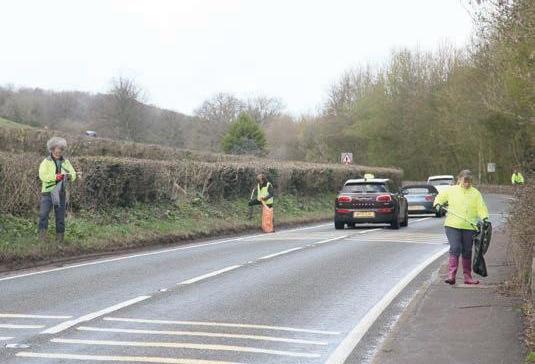
9 minute read
Environment
Climate change grants at grassroots level
The Somerset Climate emergency Community Fund has given out grants totalling £1 million to local communities to help them tackle the impacts of climate change in their area.
Somerset County Council leader David Fothergill announced the scheme last year to encourage innovative community projects that share the council’s vision of working towards a climate resilient Somerset.
Community organisations and city, town and parish councils were invited to bid for grants of between £5,000 and £75,000 for projects that can make a real difference, reduce carbon levels locally and improve our environment.
A joint initiative in Bruton and Castle Cary receives £75,000 for a scheme to retrofit high-quality low-carbon improvements to local housing.
The Bruton Town Council-led project, which has been developed jointly with Castle Cary Town Council, one Planet Bruton, Greener Cary and the Centre for Sustainable energy, will give independent advice to homeowners about the best and most carbon-efficient way of improving their homes, at the same time as working with local builders to develop their expertise in low-carbon retrofitting.
The project will run for 18 months and combine the professional expertise of the Centre for Sustainable energy with detailed local knowledge and will employ a professionally qualified co-ordinator.
Bruton mayor ewan Jones said: “retrofitting home improvements that save energy offers the greatest return on investment of all carbon emission reductions – while delivering warmer more comfortable homes, where families can live more healthily. Like many Somerset towns, Bruton has a high proportion of older, much loved but ‘hard to treat’ traditional buildings. retrofit Bruton & Cary will help to build the local skills that will create local jobs as retrofitting accelerates.”
Frome Town Council has also received £75,000 to pay for a Local Cycling and Walking Infrastructure Plan and employ a resilience engagement officer for two years.
The LCWIP will create detailed and joined-up infrastructure designs that plan safe walking and cycling routes around and through the town. The council says having an LCWIP will unlock further funding to make these designs a reality.
Councillor Paul horton said: “Increasing walking and cycling will benefit everyone in Frome by reducing traffic and congestion, improving air quality, lowering the risk of ill health, and enhancing both mental and physical well-being.
The project will start in May and will be completed by the following spring. The resilience engagement officer will support the people of Frome to become a resilient, healthy, connected community. elsewhere, parishes including Cheddar, Buckland Dinham and Baltonsborough received funding for solar panelling; Coleford to improve two playing fields and create new allotments and Shipham for an environmental improvement plan at the village school.
Retro-fitting work will improve older homes, says Bruton Town Council

Trust appeals for funds
SoMerSeT Wildlife Trust has launched its 2021 Somerset Nature reserves Fund appeal to support the maintenance of its nature reserves across the county, which costs about £2,000 a day.
The trust’s reserve managers are now starting another season’s habitat work without having been able to complete much of the work from last year, when volunteers were unable to help.
With the added problem of ash dieback, the trust has had to bring in contractors at considerable expense to help them keep on top of things.
Chair of trustees, Graeme Mitchell, said: “There’s never been a year where donations to our Somerset Nature reserves Fund have been more vital. our planned reserve management budgets simply weren’t designed to support the amount of additional costs we’re facing.
“Visitor numbers have almost doubled on our nature reserves during lockdown and, whilst it’s brilliant to see so many people out enjoying nature locally, of course more visitors mean more maintenance work, with wear and tear on paths, boardwalks, stiles and hides needing constant repair.
“We have also had to repair damage and deal with fly-tipping as a result of those few who don't treat our reserves with respect. We’re playing a massive game of catch up.
“We want to thank all our supporters for everything they’ve done to help the trust in recent times. It’s hard to ask for help again but we need people to get behind us and support the fund this year.
“We are committed to doing our best to maintain our nature reserves – for the wildlife that call them home, the wider ecology of the county, but also for everyone who lives, works and visits Somerset.”
Lake’s annual clean-up
WeDDINGrings, eels and broken glass were among the items recovered from Clevedon Marine Lake during its annual spring clean. every year volunteers from Marlens, the charity that maintains the lake, open the sluice gates to drain out the water to remove tonnes of silt build-up.
A working party of volunteers trawled the lake bed to remove debris, rescue sea creatures and search for missing treasure. Among items found were two GoPro


Caspar with the ring
cameras and three rings.
Caspar Clarke, aged nine, was the youngest volunteer to find a ring using the metal detector that he got for Christmas. After his mother posted a photo of him holding the ring on the swimmers' Facebook page, they managed to reunite it with its owner, Andrew Mitchard.
Caspar said: "Cleaning up the lake was quite fun, especially when we found cool things like eels and rings! I felt really excited and surprised that I actually found something. The man was obviously very happy for me to find it, and I was happy because he got his ring back." rowan Clarke, newly-appointed chair of Marlens, said: "A lot of people don't
Details: email volunteer@marlens.org.uk
The empty lake
realise that Clevedon Marine Lake is run by a charity and a dedicated team of volunteers. These volunteers don't just organise clear-ups when the lake is drained; they also litter-pick, clean, mend and even pick up dog poo pretty much every day."
Marlens is now working hard to prepare for what it expects to be a busy summer. rowan said: “We know that fresh air and exercise support our immunity and is good for our mental and physical health, so we don't want to discourage visitors.
“But we would ask that people help us keep the lake clean by not bringing their dogs, taking home their litter and that they donate £2 every time they visit."
Keeping Croscombe tidy
reSIDeNTS of Croscombe joined in an annual litter pick organised by the parish council as part of its ongoing efforts to keep the village looking neat and tidy. The council says rubbish is not a major problem in Croscombe but wants to keep on top of the situation.
Meanwhile, the village’s Traffic Working Group is consulting residents about possible traffic calming measures. It’s been running an online survey to gauge people’s feelings and what they would like to see done to make the village a safer place. l See Community page 79.



Making hay –and silage –while the sun shines
IT’Sthis time of year when farmers start filling their silage pits and barns with feed for their livestock for the next winter. Historically, the main way of conserving grass for animal feed was to make it into hay. However, some 50 or so years ago, With NICK GREEN silage started to be made on British farms and can be found on the menus of many farm animals.
Hay is dry grass that has been dried as quickly as possible to but rather than storing it at the 90% dry matter in hay, it is conserve the nutrients. To make hay, the grass needs to be stored at about 30% dry matter. The field process is similar to mowed, spread in a thin layer over the whole field ready for the hay making. The grass is mowed, spread out to dry, rowed up sun and breeze to dry the upper side, turned over so the lower and then harvested. side can be dried, then when it is completely dry, it is made into Silage can be baled but more often is chopped into short rows ready for a baling machine to make it into whatever size lengths and stored in a clamp. By excluding the air from the and shape bale the farmer wants. grass and sealing the clamp with polythene the sugars in the
The bales have changed from man-made sheaves to small grass act as a preservative. The grass is pickled and can be bales needing to be manhandled to large square bales requiring stored without spoiling. big machines to move them. It all sounds very simple and whilst Whilst many won’t see the finished product, lots of us will modern machinery has made the process much less labour see the tractors and trailers hauling the grass to the farm. When intensive, it still relies on five or more dry, warm days to make we find ourselves following these tractors and trailers around really good hay. our country lanes it is worth remembering the effort that needs
Silage has taken over from hay on most farms. It is still grass to go into feeding the animals in six months’ time.

Nick Green is Farms Director for Alvis Bros Ltd based at Lye Cross Farm. He is responsible for the farming and estate business and is passionate about British food and farming. As well as the business, he is involved with a number of local and national farming charities.


Tibbs Machinery Solutions Ltd: Your local supplier of precision agriculture machinery and technical support. l Trimble GPS guidance and automated steering systems l Trimble electronic loader weigh systems l Trimble automatic rate and section control conversions to slurry systems, drills & sprayers including coverage logging. l Seed drill blockage sensors l Soil analysis equipment l Camera guided weed control systems by
Garford Farm Machinery l Quicke loaders and parts

If you have machinery that would benefit from a “tech upgrade” without the expense of purchasing new machinery please get in touch.
Call: 07870 564851 or Email: sales@tibbsmachinery.co.uk New high-tech aid for farmers

NEWcamera-guided precision technology has come to farms in the West Country thanks to Tibbs Machinery Solutions at Camerton.
Following the launch of their new franchise in the autumn, they have taken delivery of their new Garford high speed inter row hoe demonstrator.
The family run company, which specialises in precision farming products are certain that this new product will be a huge asset to farmers.
Richard Tibbs, managing director, said: "With the drive towards reduced use of chemicals and improved soil structure we are proud to be able to provide progressive farmers with practical, affordable solutions to help their business evolve and be competitive.
“The Garford hoe is a great example of British engineering and can work in many drilled crops – from cereal, maize and beans to specialist vegetable and salad crops.”
Tibbs Machinery Solutions are the first dealer in Devon, Somerset and Wiltshire to offer Garford’s products and hope to set up some demonstration days, once Covid restrictions are lifted.
Richard Tibbs established the firm in 2014 following a successful career working for a number of large machinery suppliers and manufacturers.
He studied at Cannington College, held an apprenticeship at R J Tinknell & Sons and holds a BEng in Off-road Vehicle Design following studies at Harper Adams University.










